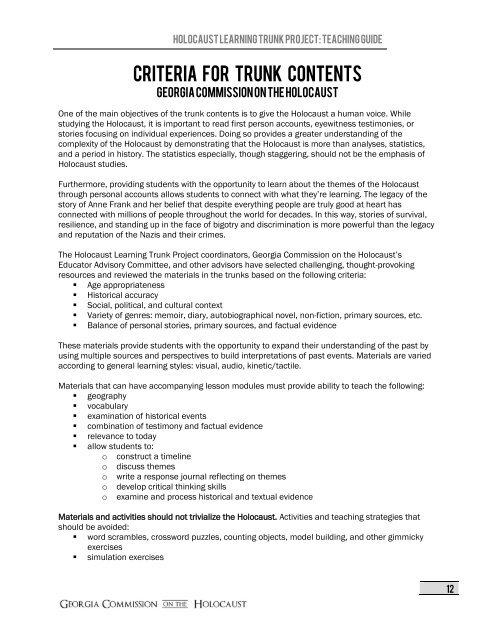Teaching Guide - Georgia Commission on the Holocaust
Teaching Guide - Georgia Commission on the Holocaust
Teaching Guide - Georgia Commission on the Holocaust
You also want an ePaper? Increase the reach of your titles
YUMPU automatically turns print PDFs into web optimized ePapers that Google loves.
<strong>Holocaust</strong> Learning Trunk Project: <str<strong>on</strong>g>Teaching</str<strong>on</strong>g> <str<strong>on</strong>g>Guide</str<strong>on</strong>g>Criteria for Trunk C<strong>on</strong>tents<str<strong>on</strong>g>Georgia</str<strong>on</strong>g> <str<strong>on</strong>g>Commissi<strong>on</strong></str<strong>on</strong>g> <strong>on</strong> <strong>the</strong> <strong>Holocaust</strong>One of <strong>the</strong> main objectives of <strong>the</strong> trunk c<strong>on</strong>tents is to give <strong>the</strong> <strong>Holocaust</strong> a human voice. Whilestudying <strong>the</strong> <strong>Holocaust</strong>, it is important to read first pers<strong>on</strong> accounts, eyewitness testim<strong>on</strong>ies, orstories focusing <strong>on</strong> individual experiences. Doing so provides a greater understanding of <strong>the</strong>complexity of <strong>the</strong> <strong>Holocaust</strong> by dem<strong>on</strong>strating that <strong>the</strong> <strong>Holocaust</strong> is more than analyses, statistics,and a period in history. The statistics especially, though staggering, should not be <strong>the</strong> emphasis of<strong>Holocaust</strong> studies.Fur<strong>the</strong>rmore, providing students with <strong>the</strong> opportunity to learn about <strong>the</strong> <strong>the</strong>mes of <strong>the</strong> <strong>Holocaust</strong>through pers<strong>on</strong>al accounts allows students to c<strong>on</strong>nect with what <strong>the</strong>y’re learning. The legacy of <strong>the</strong>story of Anne Frank and her belief that despite everything people are truly good at heart hasc<strong>on</strong>nected with milli<strong>on</strong>s of people throughout <strong>the</strong> world for decades. In this way, stories of survival,resilience, and standing up in <strong>the</strong> face of bigotry and discriminati<strong>on</strong> is more powerful than <strong>the</strong> legacyand reputati<strong>on</strong> of <strong>the</strong> Nazis and <strong>the</strong>ir crimes.The <strong>Holocaust</strong> Learning Trunk Project coordinators, <str<strong>on</strong>g>Georgia</str<strong>on</strong>g> <str<strong>on</strong>g>Commissi<strong>on</strong></str<strong>on</strong>g> <strong>on</strong> <strong>the</strong> <strong>Holocaust</strong>’sEducator Advisory Committee, and o<strong>the</strong>r advisors have selected challenging, thought-provokingresources and reviewed <strong>the</strong> materials in <strong>the</strong> trunks based <strong>on</strong> <strong>the</strong> following criteria:• Age appropriateness• Historical accuracy• Social, political, and cultural c<strong>on</strong>text• Variety of genres: memoir, diary, autobiographical novel, n<strong>on</strong>-ficti<strong>on</strong>, primary sources, etc.• Balance of pers<strong>on</strong>al stories, primary sources, and factual evidenceThese materials provide students with <strong>the</strong> opportunity to expand <strong>the</strong>ir understanding of <strong>the</strong> past byusing multiple sources and perspectives to build interpretati<strong>on</strong>s of past events. Materials are variedaccording to general learning styles: visual, audio, kinetic/tactile.Materials that can have accompanying less<strong>on</strong> modules must provide ability to teach <strong>the</strong> following:• geography• vocabulary• examinati<strong>on</strong> of historical events• combinati<strong>on</strong> of testim<strong>on</strong>y and factual evidence• relevance to today• allow students to:o c<strong>on</strong>struct a timelineo discuss <strong>the</strong>meso write a resp<strong>on</strong>se journal reflecting <strong>on</strong> <strong>the</strong>meso develop critical thinking skillso examine and process historical and textual evidenceMaterials and activities should not trivialize <strong>the</strong> <strong>Holocaust</strong>. Activities and teaching strategies thatshould be avoided:• word scrambles, crossword puzzles, counting objects, model building, and o<strong>the</strong>r gimmickyexercises• simulati<strong>on</strong> exercises12


